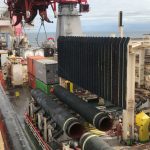Ukraine has denied any involvement in September’s attack on the Nord Stream pipelines, which were built to carry Russian natural gas to Germany.
This follows a report which cites anonymous US intelligence officials who suggest a pro-Ukrainian group was to blame.
Mykhailo Podolyak, an adviser to the Ukrainian president, said Ukraine “was absolutely not involved”.
Moscow dismissed the report as a “co-ordinated attempt to rig the news”.
German media say investigators believe they have identified the boat used to plant the explosives.
Russian gas deliveries had been suspended before the blasts. Russia shut down the Nord Stream 1 pipeline in August last year, saying it needed maintenance. Nord Stream 2 had never been put into service.
The exact cause of the 26 September blasts that hit the natural gas pipelines is unknown, but it is widely believed they were attacked.
Moscow has blamed the West for the explosions and called on the UN Security Council to independently investigate them.
Nato and Western leaders have stopped short of directly accusing Russia of attacking its own pipelines, although the EU has previously said Russia uses its gas pipelines as a weapon against the West.
The New York Times reported on Tuesday that new intelligence reviewed by US officials suggested that the Nord Stream pipeline attack was carried out by a pro-Ukrainian group.
Citing anonymous US officials, the report said there was no evidence that Ukrainian President Volodymyr Zelensky or his top lieutenants were involved in the operation.
At least 50m (164ft) of the underwater Nord Stream 1 pipeline bringing Russian gas to Germany is thought to have been destroyed by September’s blast.
Danish police believe “powerful explosions” blew four holes in the pipe and its newer twin, Nord Stream 2.
German, Danish and Swedish authorities have all been investigating the incident.
Mr Peskov said Nord Stream shareholder countries should insist on an urgent, transparent investigation.
For decades, Russia supplied huge amounts of natural gas to Western Europe. But after the war in Ukraine began in February of last year, most EU countries drastically reduced their reliance on Russian energy.














